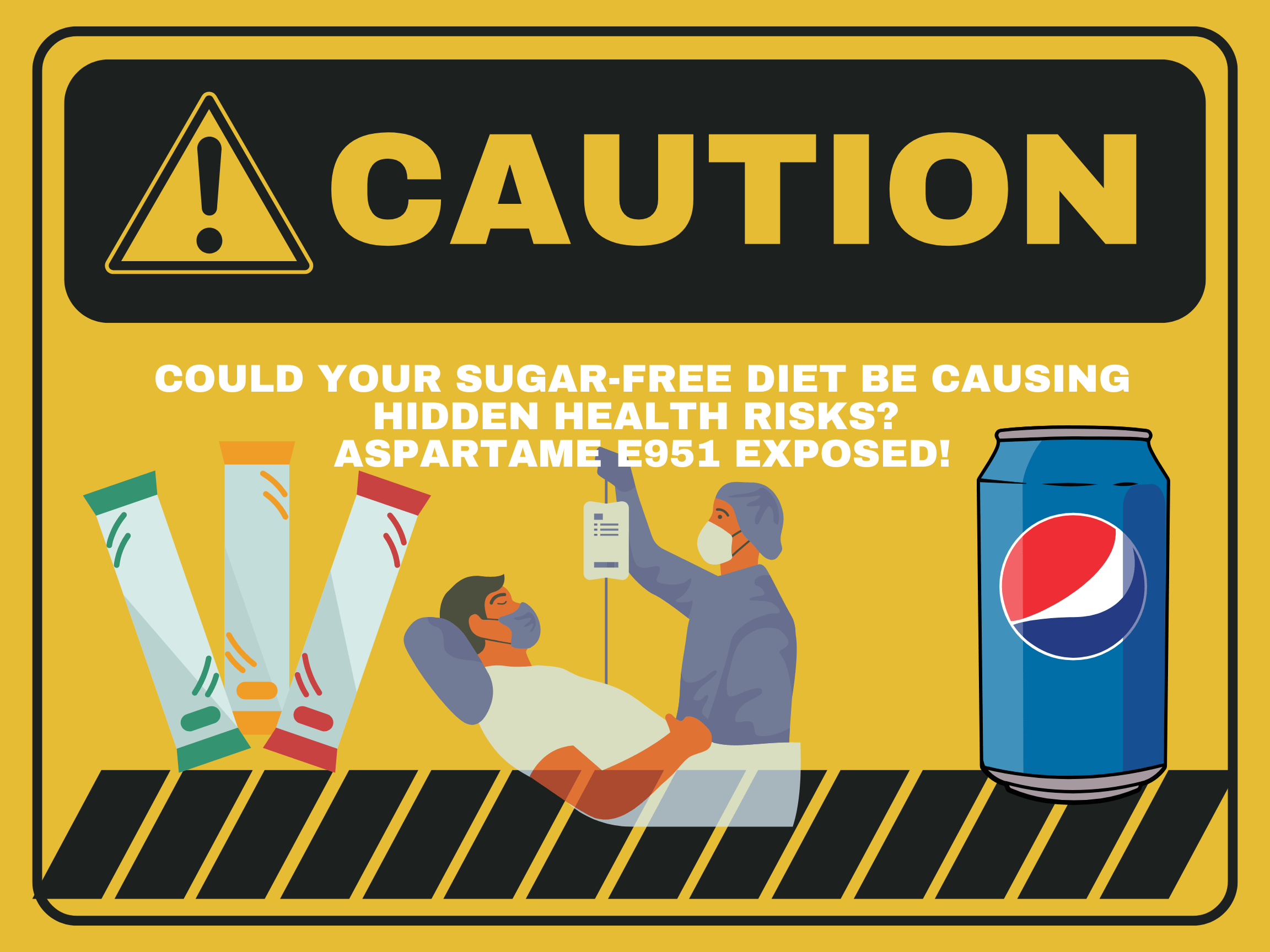
Aspartame E951 uncovered: The Shocking Truth You Need to Know, aspartame stands among the world’s most debated artificial sweeteners.
scientists, regulatory agencies, and consumers all scrutinise its effects on human health, its popularity grew because it promised sweetness without the extra calories.
However, man y reports raise alarming concerns about its potential dangers, in this article you will discover how aspartame works and why many experts question its safety.
Furthermore you will learn about its possible harmful effects on the body, stay informed and decide whether this ubiquitous ingredient truly deserves a place in your diet.
https://pmc.ncbi.nlm.nih.gov/articles/PMC10459792/
Aspartame E951 Uncovered-What Is Aspartame?
Aspartame E951 is a synthetic sweetener composed of two amino acids: phenylalanine and aspartic acid, it dates back to 1965 when a chemist accidentally discovered its sweet taste.
since then food manufacturers have added it to everything from soft drinks to sugar-free chewing gum.
this low-calorie sweetener remains popular among individuals seeking weight management solutions.
Aspartame is widely used as a sugar substitute, yet ongoing debate around artificial sweeteners highlights the importance of understanding how everyday food choices may affect overall health. If you’d like to explore a more balanced approach to wellbeing through mindful lifestyle and nutrition choices, our Holistic wellbeing content looks at practical ways to support long-term health.
Why Do Manufacturers Use Aspartame E951?
Manufacturers favour aspartame E951 because it delivers intense sweetness using minimal quantity, this approach reduces production costs and appeals to health-conscious consumers.
The beauty is with E951 is it dissolves easily and does not linger on the palate like other sweeteners. Consequently global consumption soared as more diet products emerged on supermarket shelves.
How Aspartame E951 Is Absorbed
Your body breaks aspartame down into its core components soon after ingestion, these components include methanol, phenylalanine, and aspartic acid.
Researchers note that methanol converts into formaldehyde, which can raise safety concerns. However, regulatory agencies contend that normal intake keeps methanol levels within acceptable limits.
Nevertheless, critics worry about cumulative effects, especially among heavy users.
Controversies and Conflicting Research on Aspartame E951
Many experts fiercely debate the real impact of aspartame E951 on human health, some studies suggest that moderate intake poses no significant hazards for healthy adults.
There are other researchers who link it to health complaints ranging from headaches to severe neurological issues.
These conflicting findings leave consumers confused about aspartame’s true risk profile, none the less the sweetener’s widespread presence in foods raises further questions about long-term safety.
Potential Harmful Effects on the Brain
Aspartame’s breakdown components can cross the blood-brain barrier, some scientists claim that phenylalanine and aspartic acid may overstimulate neurons.
As a result susceptible individuals could experience anxiety, headaches, or even mood swings.
Additionally, high phenylalanine levels can disrupt neurotransmitter balance, affecting cognitive function. Critics argue that these disruptions might worsen conditions like depression or attention deficit hyperactivity disorder.
Nevertheless official regulatory bodies often dismiss Aspartame E951 saying these concerns are unproven in large population studies.
Possible Implications for Metabolic Health
![]()
Researchers suspect that aspartame E951 influences insulin sensitivity and glucose metabolism. They observe that artificial sweeteners may confuse the body’s natural response to sugar, this disruption could lead to weight gain instead of weight loss.
Certain studies link aspartame consumption to an increased risk of metabolic syndrome, whereas other research indicates no direct link between moderate aspartame use and obesity.
This discrepancy fuels heated debates and calls for more rigorous, long-term investigations.
Digestive Concerns
![]()
Aspartame’s components can alter gut bacteria, according to some preliminary research, an imbalance in gut flora sometimes triggers digestive issues like bloating or irregular bowel movements.
A compromised gut microbiome can weaken the immune system and increase inflammation, However, yet the scientific community has not reached a firm consensus on these effects.
Potential Cancer Risks
![]()
Animal studies have attempted to determine whether aspartame contributes to tumour formation, some research found an increased incidence of certain cancers following prolonged exposure.
Other experiments did not detect a definitive link between aspartame and cancer, regulatory agencies often emphasise that human data does not consistently support such claims.
Despite official statements, many consumer advocacy groups remain sceptical and demand more comprehensive studies.
Effects on Children and Sensitive Populations
![]()
Children often consume high amounts of artificially sweetened drinks and snacks, some parents worry that aspartame might interfere with children’s growth and cognitive development.
individuals with phenylketonuria must strictly avoid phenylalanine, a key aspartame component.
Pregnant or breastfeeding women sometimes receive medical advice to limit aspartame intake.
These vulnerable groups require extra caution because potential risks may be greater.
What Do Regulatory Agencies Say?
![]()
Agencies like the European Food Safety Authority maintain that aspartame E951 remains safe below recommended daily limits.
Critics question whether these limits adequately account for cumulative exposure from multiple products.
Hence they argue that current guidelines might not reflect recent scientific advancements, Thereupon, calls for updated evaluations and more transparent data reviews continue to grow.
Industry Influence and Funding Bias 
Industry-funded studies often report minimal or no harmful effects associated with aspartame, Independent studies on the other hand, sometimes reveal concerning outcomes for human health.
This discrepancy raises questions about financial interests shaping scientific conclusions, Transparency in research funding remains crucial for establishing trust among consumers and experts.
Recognising Aspartame in Ingredient Lists
![]()
Manufacturers often label aspartame as E951 or simply list it by name, reading ingredient labels helps you identify whether this sweetener appears in your favourite products.
Additionally, certain products highlight their sugar-free status, which suggests possible aspartame E951 use.
Alternatives to Aspartame
Many consumers seek natural sweeteners like stevia or monk fruit extract, these alternatives provide sweetness without some of the controversies tied to aspartame, for that they can taste different and may require adjustment in recipes.
Sugar alcohols including xylitol or erythritol, also serve as possible replacements, excessive intake of sugar alcohols might cause digestive discomfort, experimenting with various options enables you to find the best fit for your needs.
Practical Steps to Reduce Aspartame E951 Intake
Gradually limit your intake of diet sodas and other artificially sweetened drinks, opt for water infused with fresh fruit if you crave something more flavourful.
Choose whole or minimally processed foods to decrease reliance on hidden artificial sweeteners. Prepare homemade meals to maintain control over ingredients and sweeteners, as mentioned earlier, read labels meticulously paying attention to terms like “low-calorie” or “diet”.
Holistic Perspective on Health Risks
Aspartame’s risks should not overshadow other crucial lifestyle factors, such as exercise and balanced nutrition. Focusing on whole, nutrient-dense foods often fosters better long-term health outcomes.
Moderation remains key when deciding whether to include artificial sweeteners in your daily routine.
Emerging Research and Future Directions
Scientific studies continue to explore how aspartame interacts with genetic and environmental factors, new research employs advanced methods to detect subtle biological changes linked to sweetener consumption.
Future studies may offer clearer insights into individual susceptibility and long-term consequences, With evolving evidence, guidelines and public perceptions regarding aspartame could shift substantially.
Expert Tips for Informed Decision-Making
Consult a qualified dietician if you have concerns about aspartame’s role in your diet, request personalised advice based on your medical history and nutritional needs.
Seek evidence-based information from reputable sources, including peer-reviewed journals and trusted health organisations.
A Note on Balanced Choices
Use common sense when deciding how much aspartame you consume, no single ingredient guarantees perfect health or absolute harm by itself. Regardless, awareness empowers you to make choices aligned with your well-being.
Conclusion
Aspartame’s reputation reflects decades of scrutiny, conflicting research, and persistent consumer demand for safer options, although authorities often deem it safe at prescribed limits, questions remain about cumulative or long-term effects.
Critics highlight potential neurological, metabolic, and digestive concerns that warrant further investigation, Ultimately, your health decisions should incorporate reliable data and individual risk assessments, remember to stay informed, remain critical of research sources, and prioritise balanced eating habits.
We hope you found this article informative to you, here are a few more articles that you may well find interesting.